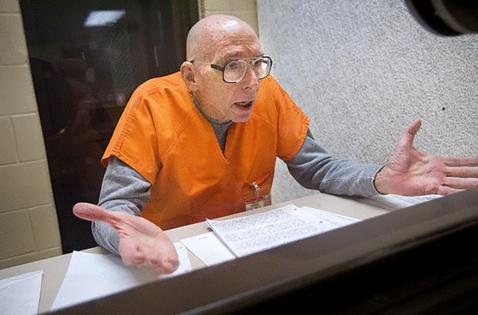Florida death row inmate Tommy Zeigler wins new hearing
Published in News & Features
ORLANDO, Fla. — After nearly 50 years on Florida’s death row, convicted murderer Tommy Zeigler will get what his attorneys say is his last chance at winning freedom.
Circuit Court Judge Leticia Marques on Tuesday agreed to hold an evidentiary hearing that will consider the most recent DNA results from the bloody 1975 crime scene. Hundreds of samples of clothing and other items were collected where four people — Zeigler’s wife, in-laws and a customer — were killed on Christmas Eve that year at his family’s Winter Garden furniture store.
The hearing is scheduled to begin Dec. 1 at the Orange County Courthouse and will likely last a week.
“This is absolutely fabulous news for Mr. Zeigler,” said Terry Hadley, the attorney who has represented Zeigler since his 1976 trial. “We’ve been trying for years and years. …We are very delighted.”
Hadley added that a judge agreeing to hold an evidentiary hearing at this point “was highly unusual” and that his team of defense attorneys had a high bar to clear when they presented their case for the hearing.
“Hopefully, his conviction will be reversed and he will get a new trial,” Hadley said.
In her three-page order, Marques did not explain why she decided to hold an evidentiary hearing decades after Zeigler was convicted and sentenced to death.
She only stated: “Having reviewed Defendant’s motion, the state’s answer, having considered the argument of counsel and the record in this case, the court finds an evidentiary hearing is required.”
At an Aug. 7 conference, defense attorney Dennis Tracey argued that the most recent 2022 DNA testing shows Zeigler is innocent.
“The results were wholly inconsistent with guilt,” Tracey said. “Mr. Zeigler’s shirt and pants showed no DNA from the family members. He simply could not have been the shooter.”
However, state prosecutors have long contended that Zeigler was rightfully convicted by a jury after a lengthy trial with witness testimony and that subsequent DNA testing, including the most recent ones, did not show that he could not have committed the killings.
“This still comes up short,” state Assistant Attorney General Joshua Schow argued at last week’s conference. “This was not to be a piecemeal project, where we test a little bit (of the evidence), then run to the court…It could keep going on ad infinitum.”
Orange-Osceola State Attorney Monique Worrell’s office also said in a court filing last month that the recent DNA results are not enough to overturn Zeigler’s convictions and release him from Florida’s death row in Raiford. “Nothing from this new round of testing changes the fact the jury got it right the first time around: Zeigler is guilty beyond a reasonable doubt,” that filing read.
Even so, an evidentiary hearing is a significant step for Zeigler’s contention that he was wrongly convicted.
An evidentiary hearing could lead Marques to eventually rule Zeigler could leave prison on bond before a new trial is held, or that the jury in 1976 rightly and fairly convicted him.
Zeigler turned 80 last month. He is the longest serving death row inmate in Florida. His execution has been delayed several times by appeals.
Hadley said last week the prisoner is in poor health.
The long and winding Zeigler case has drawn criticism and scrutiny for decades, including from some civil rights advocates who have questioned the court proceedings.
Zeigler’s case was featured on the popular television show “Unsolved Mysteries.” There was a documentary film “A Question of Innocence” and a book “Fatal Flaw: A True Story of Malice and Murder in a Small Southern Town.”
On Christmas Eve in 1975, Zeigler — who was 30 years old at the time — arrived at his furniture store on Dillard Street with his wife, Eunice, and her parents, Perry and Virginia Edwards. His in-laws were looking to buy a new recliner for Christmas, and the store had already closed for the day.
According to Zeigler, Charlie Mays — a customer who owed his store money and was among those killed — was robbing the business when the family walked in. Mays shot Ziegler in the stomach, Ziegler has contended.
But prosecutors told the jury that Zeigler had planned the murders for weeks before his in-laws came to town for a visit. They pointed out that Zeigler took out two $250,000 life insurance policies in his 32-year-old wife’s name days before she was murdered.
Prosecutors said Zeigler lured Mays, along with two other Black men, to the store to frame them for the murders. Eunice Zeigler and Virginia Edwards were shot and killed. Perry Edwards was beaten with a steel crank and then shot. Their bodies were found in pools of blood, according to trial testimony.
Prosecutors added Zeigler later killed Mays by beating him over the head with the crank.
Defense attorneys said Mays was the likely culprit in the murders. They pointed out Zeigler was already wealthy and close to his in-laws, therefore he had no motive for the killings.
Blood from Perry Edwards was found on Mays’ pants and shoes. Mays DNA was found on Eunice Zeigler’s coat.
All the family members were shot in the head at close range, and therefore blood would’ve splattered on Zeigler, according to defense attorneys. But Zeigler did not have any of his family’s blood or DNA on his clothes. The blood on Zeigler’s shoes was from when he walked across the bodies to call police, they said.
The jury recommended life in prison. But the judge overruled their decision and imposed two death sentences.
_____
©2025 Orlando Sentinel. Visit orlandosentinel.com. Distributed by Tribune Content Agency, LLC.







Comments